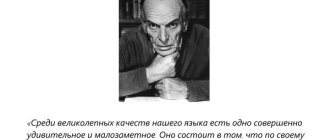LiveInternetLiveInternet
Famous Kyrgyz writer, writing in Kyrgyz and Russian, Hero of the Kyrgyz Republic (1997), People's Writer of the Kyrgyz USSR (1974), Hero of Socialist Labor (1978), member of the CPSU since 1959. Every person should listen to the quotes of Aitmatov Chingiz, because these are very smart phrases.
● People of yesterday cannot know what is happening now, but people of today know what happened yesterday. ...but tomorrow, today's will become yesterday's.
● It’s not for nothing that people say: if you want to hide your shame, you need to shame someone else.
● It seems to me that people do not understand how much misery and unhappiness in their lives arises from laziness.
● Somewhere in the distance there was a battle and blood was shed, and our battle at that moment was work…. We were on the collective farm from early morning until evening. All the talk was only about the war, and the most welcome guest in every house was the postman.
● At the moment when the moon, so huge and clear, rose above the crest of that dark mountain, the stars that were in the sky opened their eyes at once. I couldn't shake the feeling that they could see us.
● When you make a discovery for yourself, everything in you is consistent and harmonious, then the enlightenment of the soul comes.
● There is one situation with all dreams: they are born in the depths of the imagination, then they fail because, out of stupidity, they began to grow without roots, like some flowers and trees...
● It’s always like this: after any, even the most brilliant performance, the curtain appears.
● When you are on the ground, you don't think about the ground. When you are at sea, you constantly think about the sea.
● I can guarantee you: the world will teach you to obey, because there is one extreme need in the world - to get a piece of bread.
● There is no way for a person to take away his homeland, because he can only take away longing. If it were possible to carry away the Motherland, then the price would be worthless.
● Oh, great Earth, you hold us all on your chest. If you don’t give us happiness, then why should you be the Earth, and why should we be people who are born into the world?! Yes, we are your children, so give us happiness, make us happy!
● I am absolutely sure that the speed of thinking cannot be compared with the speed of light. The speed of thought is everything, the speed of light is nothing. A thought that goes into the past can move backwards in time and space. She is omnipotent.
● They haven't seen each other since then. Their relationship was completely adequate, but their life paths diverged...
● However, life works like this: if there is happiness, it means that misfortune is hiding next to it, which watches over you and is immortal and relentless.
● I will always remember that spring when victory came. I will always remember how people greeted people from the front. But I still can’t figure it out: what was more at that moment - grief or joy?!
● A woman is a woman. They cry so often, these women. They cry because they feel sorry for everyone..
Chingiz Aitmatov
Novelist, screenwriter, passed away on June 10, 2008 at the age of 79
If they gave me a second life , I would turn around...
I grew up in an village. And it seems to me that childhood in the village is richer. Although it must certainly be interspersed with deep layers of city life. It is necessary at some periods of life to communicate with civilization. The city gives modernity of thinking.
My grandmother is smart, knowledgeable, sensitive, and a craftswoman and storyteller; she helped me see the world poetically and understand beauty. In those days there was no trace of television or even radio. You can say that my grandmother was my TV.
I come from a family that fell under the steamroller of Stalinist repressions. When my father was arrested, at school they began to consider me the son of an enemy of the people.
I won’t say that I’m such a brilliant diplomat... Many people understand diplomacy as some kind of obligatory trick... I always act openly, honestly, sincerely.
One day at a reception they served some Japanese food. Exotic, incomprehensible food with flowers was very beautifully laid out on a huge platter. I decided that once it was served to the table, everything was edible. And he ate the flowers! Later I found out that they were decorations. I laughed at myself for a long time.
Life cannot freeze, close at one point. Even while preserving and protecting traditions, we cannot do without renewal.
Cruelty should be shown not for the sake of relish, but in the name of the desire to eradicate.
I believe that the more powerful mass culture is, the stronger it is necessary to resist it, creating new original artistic values and preserving those that have already been created.
It is sad to see that along with the change in economic relations, our spiritual wealth has also begun to become scarce.
The crisis of religious consciousness (I am not singling out any particular religions) has already arrived. I realized this recently, when in one of the villages of Kyrgyzstan a man who had converted from Islam to another faith died, and the relatives carrying him to the cemetery were blocked on the way by a frenzied, violent crowd of local Muslims. And the relatives had to take the deceased hundreds of kilometers away and bury him there. If we cannot give way to each other in front of the cemetery, what can we say about life?
I believe that all life is divine in nature.
Nationalism is not such a terrible thing, although it is considered the enemy of everything and everyone. We need to return the original meaning to this word. A nationalist is a person who fights to preserve his culture and language. Each nation has its own problems, everyday, pressing ones. They require decision, attention, effort. In our country, it is generally accepted that if he is a nationalist, then he must be crossed out. And who will take care of their nation?
If there was such an opportunity, I would write to Alexander Trifonovich Tvardovsky... He was a great poet and an outstanding editor. And a very smart person. It would be something to write to him about.
Everyone is talking about globalization. But it also has two sides, on the one hand, it is communication, accumulated experience, but on the other hand, it leads to aggression, murders, and wars.
What kind of cosmopolitan am I with such a face?
What worries me most is the issue of kindness and humanity. How to protect people, how to preserve what nature provides? How not to lose touch with it, and what was embedded in us by our ancestors, how to remain human, protect, not let it be destroyed, and pass on to our descendants the amazing world of our incredibly beautiful planet.
A person must be prepared to fight.
I don’t like it when people endowed with public powers, for their own selfish interests, begin to pass off white as black, and black as white.
I stand for life to be fulfilling. So that a person does not lack basic things. There are also bigots who preach abstinence, but themselves are not averse to having what is still in short supply. But sometimes people themselves don’t notice how things begin to weigh on them. How the passion for hoarding emasculates everything human. It must be said that the test of satiety and abundance is a very big temptation.
An artist is above recognition and fame. He is primarily guided by the desire to express himself. Although, of course, it is much better when the artist is recognized.
Ernest Hemingway has had a huge influence on me since childhood At one time I was the editor-in-chief of the Foreign Literature magazine, and we published many American authors. Recently in Germany, one of my stories, “The Piebald Dog Running by the Edge of the Sea,” was staged on the opera stage and was called, almost after Hemingway, “The Boy and the Sea.” By the way, the book was published under the same title. I'm very pleased with this parallel. From world literature, Marquez, Joyce, and Proust are close to me. One of our writers is Fazil Iskander.
I write in two languages. But in Europe I write only in Russian. The Russian language provides more opportunities.
The reader is always right in his conclusions.
Drug addiction is the cash cow of terrorism. And in order to overcome it, and with it to defeat terrorism, we must end poverty.
What I especially don’t like is fashion for certain things.
I don’t allow myself to speak out sharply, accuse someone of something, make a scandal, I try to be more restrained.
There is nothing more precious to a person than memory. If it is not there, then there is nothing, a person ceases to be a person.
into the ideal woman . And intelligence, of course.
If every woman, in an impulse to succeed, deprives herself of the opportunity to become a mother, wife, mistress of the family, then what will we come to?
I miss humor , and I always feel this. I really envy people who perceive life humorously. I'm a little gloomy myself. I have a tragic feeling about life. And I don’t know how to deal with myself...
From public speeches
World of Aitmatov
The great poet Rasul Gamzatov has the following thoughts: “If they ask you who you are, you must show your passport, and when they ask where you are from, you must name the names of the great people of your people.” We, the Kyrgyz, can be proud that we come from the great mountains of the land of Manas the Magnanimous. That we come from Issyk-Kul, and there are no colors or words that can describe its beauty. What can we say proudly: “We come from Kyrgyzstan - the homeland of Chingiz I. In the beginning there was a word.” Only it can awaken something in the human soul, and the Kyrgyz are one of the rare peoples who reverently and deeply treated its greatness. Our ancestors left us a legacy not of architectural structures like the Colosseum and the Taj Mahal, but of a monumental creation of the national spirit and a temple of the national soul - the epic “Manas”. It played no less a role in preserving the nation than the Great Wall of China did in preserving the Chinese people. The phenomenon of the epic lies in the fact that all its storytellers - manaschi - connected the beginning of their creative activity with a dream or inspiration from above. Before this, they did not even know the content of the epic and did not have a high storytelling gift.
Having deeply comprehended the ancient folk epic tradition, imbued with a high spirit, Chingiz Torekulovich became its direct successor and heir in modern conditions. Therefore, summarizing his works, one can obtain the following quintessence or five commandments of Aitmatov.
Take care of nature
With his philosophy, Aitmatov acts as a defender of the earth and nature and shares the truth revealed to him. People cannot remake the planet, but they can educate a person, his conscience, reason, and morals. The main inheritance in the world is not wealth, not the sun, or even the earth, but the word. God addresses man through him. This means that before protecting the planet, a person must revive spirituality and protect the word.
Progress and civilization are by no means opposed to nature. The writer consistently described the animal world in parallel with the human world. These are a pacer, a deer, a wolf, a leopard, an eagle, a dog, a sheep, a camel, and an owl. Those who have the right to life on this earth, like people. Who sympathizes with the crucified hero Avdey Kalistratov in the novel “The Scaffold”? Akbar's blue-eyed wolf who reads the thoughts and feelings of a dying person. The leopard finds death in a cave not alone, but together with a man seeking God and loneliness, in the last prophetic novel “When the Mountains Fall.”
With his works, Aitmatov urges people not to test the patience of nature. Raising planetary problems, he shows that he belongs not only to our time, but simultaneously to all historical eras.
Take care of the world
The twentieth century will remain in history as a century of brutal wars and enormous human sacrifices. Chingiz Aitmatov represents the great post-war generation, which reflected the drama of its time in its creativity.
Aitmatov managed to expose the cruel and inhumane essence of war. His story “Mother's Field” is a protest against violence. In Tolgonai's dialogue with Mother Earth, he conveyed the cry of all the women in human history who lost their loved ones and children in the fire of war.
"Thou shalt not kill!" is also the main commandment of the novel “When Mountains Fall.” A soldier going to the front to fight fascism remembers his parents’ parting words and wonders whether he has the right to take someone else’s life.
Protect humanity
Love for man, faith in goodness and beauty, thirst for peace, justice and caring attitude towards the soul constitute the main thing in Aitmatov’s work. Literature should help in the fight against indifference. It is no coincidence that even at the UNESCO level they started talking about the need for “globalization with a human face.”
In all countries of the former USSR today, moral guidelines are distorted. We don't know what the new world order will be like. There are material values - money, property, high social status. But there are others - spiritual ones, which determine a special moral way of life, human relationships, ideas and ideals of the nation. The education of kindness and human morality cannot be entrusted to the UN and the IMF. Only high art and artistic creations shape the consciousness of millions of people around the world.
The great Russian writer Leo Tolstoy said: “The great and noble mission of literature is to make a person love life and the world.” And I believe that Chingiz Aitmatov fulfilled this mission. The heroes of his works are simple and understandable, like our neighbors, friends or relatives. Aitmatov found prototypes of many of his heroes among his fellow countrymen from the village of Sheker. Through their destinies, the writer revealed the eternal themes of human morality and the meaning of life. In them he raises issues of a planetary scale.
Cherish the memory of the past
Every people and civilization exists if it preserves its history, originality and identity. A person without a homeland and its history is a “mankurt”, a nobody, and in the era of globalism he is doomed to spiritual and moral degeneration. In his works, Aitmatov rejected and condemned historical oblivion and drew attention to such topics as lack of spirituality, ignorance and greed. For a deficiency of conscience can lead to the most sophisticated antisocial actions.
Events in Aitmatov’s works cover almost the entire world. The destiny of an individual is connected with the destiny of a nation, and the destiny of a nation is connected with the destiny of all mankind. Therefore, in the novel “And the Day Lasts Longer than a Century,” Edigei fights so that progress does not trample the past, and the cosmodrome does not displace the cemetery.
As the great humanist Dmitry Likhachev said: “The cultural values accumulated by peoples do not belong to any municipality, museum, department or even a separate country, they belong to all humanity.” Spirituality carries a powerful creative force. The irony of fate is that Aitmatov’s works are most read in Germany, although during the war the Germans were the occupying party from which we defended ourselves.
Cherish love and freedom
Freedom is as beautiful as it is dangerous. When it is not there, it is demanded; when it is there, it is distorted. But without real freedom there will be neither spiritual nor political sovereignty.
Aitmatov’s heroines in love are Jamilya (“Djamilya”), Aidana (“The Eternal Bride”), Altynay (“The First Teacher”), Zaripa (“And the Day Lasts Longer than a Century”), Bubuzhan (“Gulsarat”), Aidana (“When They Fall mountains") - how Kyrgyz Madonnas, with their fragility and spiritual purity, embody the triumph of love and eternal life-affirming beauty.
In Aitmatov’s works, love is depicted not as a platonic attraction, but as a spiritual and emotional miracle. And the narrative never comes to physical intimacy, which has a greater impact on the reader. In the writer’s works, lovers do not always live happily and do not always win. The meaning of love is a state of flight. Aitmatov writes about this heartfeltly.
Instead of PS
After the collapse of the USSR, many books published in it turned out to be unclaimed, but not Aitmatov, which may be due to the writer’s desire to preserve the dialogue of cultures and civilizations and different languages as a universal heritage.
Aitmatov comes from a village, and he is, first of all, Kyrgyz. With the brilliance of his mind, wise and strong intuition, the writer reflects the soul of the “great mountains and steppes.” But he is also a Eurasian, because, being from the East, he became a person with a Western mentality. He is a creator and a unifier. His readers in all corners of the world can proudly say: “my Genghis.” But not everyone can say, for example, “my Genghis Khan.” This is the difference between culture and politics, where the second destroys and the first creates.
One of the famous people said that if a nation has not made its contribution to the global treasury, then it has not justified its existence. We are lucky in this regard. Firstly, with the epic “Manas”. Secondly, with Aitmatov. His words are like biblical commandments. They contain strength and energy that have a miraculous effect on our minds and morals. Humanity is united in Shakespeare and Balzac, Goethe and Pushkin, Tolstoy and Dostoevsky, Faulkner and García Márquez. And today we are united in Aitmatov.
Russian writers about the late Chingiz Aitmatov
The program is hosted by Alexander Gostev. Radio Liberty correspondent Vladimir Gubailovsky is taking part.
Alexander Gostev: One of the most famous Soviet writers, Chingiz Aitmatov, died in Germany last night. He was transported from Kazan to a clinic in Nuremberg in an unconscious state with a diagnosis of severe pneumonia and kidney failure. Doctors named the cause of death as complete lung failure. Aitmatov's books have been translated into many languages of the world, and she has been awarded many literary prizes and awards.
Vladimir Gubailovsky: He was born in the village of Sheker in Kyrgyzstan in 1928. His writing life was happy, and his rise was rapid. When he was 35 years old, his book “Tales of Mountains and Steppes” was awarded the most prestigious Lenin Prize in the Soviet Union. Aitmatov's fame grew. He was convenient for the authorities, in particular because he became the embodiment of the myth that small nations and cultures flourish under Soviet rule. But it cannot be said that Aitmatov’s fame was undeserved. His books “The White Steamer” or “Pied Dog Running by the Edge of the Sea” are really good. Roman Ai, one might say, secured his status as a living classic. The novel was published in 1980, and it was difficult to imagine that this was the writer’s last real success. Ai's most noisy novel was published in 1986 and became one of the signs of perestroika, but the book itself did not stand the test of time. Almost all of Aitmatov’s work is connected with the Novy Mir magazine, and the modest “Novy Mir” editors did a lot, very much so that the reader saw Aitmatov as he became. After “The Scaffold,” Aitmatov fell silent for a long time. His last book was published in 2006 and did not cause any enthusiasm.
Radio Liberty correspondent in Germany Yuri Veksler speaks about the death of the writer.
Yuri Veksler: Writer Chingiz Aitmatov died in a clinic in Nuremberg, where he was transported from Kazan in an unconscious state with a diagnosis of severe pneumonia and kidney failure. He was admitted to the intensive care unit and placed in an induced coma. Doctors named the cause of the writer’s death as complete lung failure.
Aitmatov's works have been translated into many languages of the world. He died in Germany, in a country where he was perhaps more popular than anywhere else on earth. Several years ago I had the opportunity to talk with a writer in Berlin, and when I asked how he explained his, without exaggeration, nationwide popularity in Germany, Chingiz Aitmatov answered...
Chingiz Aitmatov (archive) : I sometimes think about it myself, it also fascinates me and at the same time it is some kind of mystery for me. There are two countries where readers are now a priority for me even more than in their homeland, these are Germany, that is, the German-speaking region, and Switzerland, and Austria - the same thing, and Japan. In the West and in the East. And I don’t know how to explain it. Sometimes, I think, the fact that we all survived the Second World War together is something that connects us. And the fact that I often have these motives is reflected, apparently, it is our common pain that binds us. Now I was presenting my new small book, well, these are autobiographical memoirs, “Childhood in Kyrgyzstan”, about my childhood, my youth. But it is no coincidence that this book appeared. It shows how, even in childhood, these movements arose, some intuitive movements towards what is now creativity for me, this word, plot, images. Then childhood itself... the war - it coincided with my adolescence, it made a strong impression on me, because I saw life completely in turn as its friend. But this is all to say about what our modernity is now - inside and out.
Yuri Veksler: Recently, a committee was created in Turkey to nominate Aitmatov as a candidate for the Nobel Prize in Literature. This initiative was supported in all Turkic-speaking states of the world. Until recently, Chingiz Aitmatov combined his writing activities with the work of the Ambassador of Kyrgyzstan to Belgium, NATO and the European Union.
Vladimir Gubailovsky: The work of Chingiz Aitmatov was loved by millions of readers and highly valued by professionals. Fazil Iskander speaks about Chingiz Aitmatov.
Fazil Iskander: Chingiz Aitmatov was one of our best prose writers. He wrote for quite a long time and had a huge audience. His works such as “Farewell, Gyulsary!”, “The White Steamer,” “And the Day Lasts Longer than a Century,” “The First Teacher” were read literally by the entire reading country, and he was one of the most beloved writers. He combined an excellent knowledge of Central Asian life and combined this with the Russian language, quite fluently and quite confidently. As far as I know, his works were translated into European languages and were loved there too. In general, one of the most remarkable writers of our country has died.
Vladimir Gubailovsky: Iskander is almost the same age as Aitmatov, but Aitmatov is also highly valued by writers of other generations and movements. Viktor Erofeev speaks.
Vladimir Erofeev: Aitmatov was a happy man. When I found out that he died, I went on the Internet, to the site “Aitmatov in Pictures” and first saw a Kyrgyz youth, so disheveled, disheveled, with bright eyes, that is, he is such a mountain teenager with dreams of the future of literature. And his last photo is of such a sleek European ambassador signing declarations. And how many parallel and perpendicular lives there were from the first to the last photograph, how many intersections, articulations, this, of course, is happiness for people. So a happy man died.
Vladimir Gubailovsky: Aitmatov’s native language was Kyrgyz, but he received his worldwide fame as a Russian writer, because Aitmatov was translated into all languages from Russian. Both by his fate and by his word, Aitmatov connected Asia and Europe and brought news about his people.







